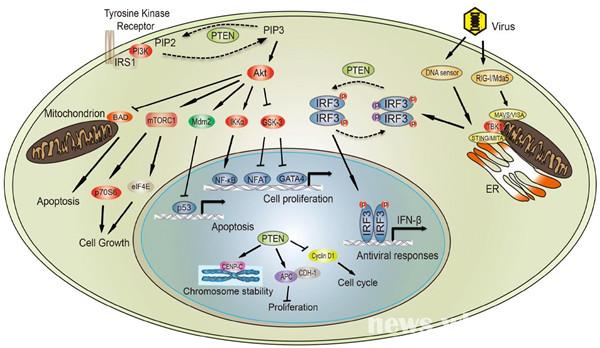Professor Guo Deyin and his research group recently found that human tumor suppressor protein PTEN not only functioned as anti-tumor subsistence, but also played a key role in strengthening human’s innate antiviral immunity. The related research findings were published online in Nature, Nature Immunology, on December 21.
The research article was entitled “The Tumor Suppressor PTEN Has a Critical Role in Antiviral Innate Immunity” with Doctor Li Shun and Professor Guo Deyin as the first author and the corresponding author. This research finding was part of a major scientific research program funded by National Natural Science Foundation of China.
Innate immunity, also known as natural immunity or inherent immunity, is the first line of defense for human body to fight against viruses and other pathogens. It can quickly identify the pathogens and stimulate the immune system, assist in adjusting and activating the adaptive immune response, which has played an essential role in resisting microbial infection and anti-tumor immunity. In the past 20 years, the innate immune response, Type I Interferon Signal Pathway in particular, has always been the research focus in the field of biomedicine. While new achievements and breakthroughs have been constantly made, the understanding of its regulatory mechanism is still ambiguous.
PTEN is an important anti-tumor gene discovered around a decade ago. It was believed that its mutation or functional defects were directly related to a variety of tumors, including breast cancer, endometrial cancer, thyroid cancer, prostate cancer, leukemia, lung cancer and liver cancer. However, it still remained uncertain whether it was able to function in antiviral immunity. What Guo’s study found was that PTEN protein has played a key role in antiviral innate immunity through its adjustment to IRF3 which was the key transcription factor produced by the Type I Interferon.
The study also found that the cells PTEN lacked were significantly more sensitive to viral infection, and the oncolytic virus which was sensitive to interferon had great self-replication efficiency, leading to apoptosis and disruption of the tumor cells. Therefore, the study provided a theoretical basis for tumor therapy of the loss of PTEN, and illustrated the close interaction between cellular anti-viral and anti-tumor immunity. Hence it has a significant influence on the research of cellular antiviral mechanisms, new anti-viral and anti-tumor strategies.

The website for the article:
http://www.nature.com/ni/journal/vaop/ncurrent/full/ni.3311.html
(Rewritten by Yijie Huang, Edited by Mengtian Wang & Sijia Hu)